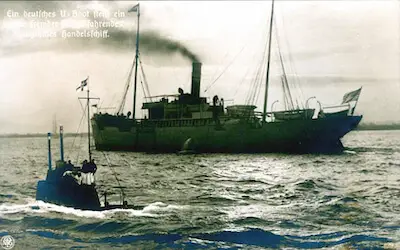A state of high alert, often a simulated panic for comic effect.
Panic stations
What's the meaning of the phrase 'Panic stations'?
What's the origin of the phrase 'Panic stations'?
The expression ‘panic stations’ is a rare linguistic beast, in that it is a nautical phrase that doesn’t originate from the heydays of sail. One of the numerous meanings of the word station is ‘a position assigned to a man on duty’. The Royal Navy had several commands to call sailors to their stations, notably ‘action stations’, which was ordered when a ship came under attack.
Oddly, for a term that sounds like an ironic play on words, ‘panic stations’ was an actual command. This is apparent in a report titled Behind the Veil, published in The Times, November 1918:
Alarm gongs had already sent the guns’ crews to their invisible guns and immediately after the explosion ‘Panic stations’ was ordered, followed in due course by ‘Abandon ship’.
The above story itself relates to HMS Prize, one of the Q-ships that were used by the UK as a defence against the German U-boat submarines in World War I. Q-ships were heavily armed military vessels disguised as slow and rusting cargo ships, and were filled with wood and other buoyant cargo to enable them to stay afloat after being hit. The disguise was intended to induce the unsuspecting U-boat, assuming there to be no risk, to surface, at which point the Q-ship’s hidden guns would be unveiled and an attack would commence.
As to panic itself, the word is sometimes said to be derived from panicum, the Latin word for millet – which is also the source of the French ‘pain’ , that is, bread. One of the theories as to the fate of the Mary Celeste, which was discovered abandoned in the Atlantic in 1872 with the crew mysteriously missing, is that the ship’s bread was contaminated with the hallucinogenic ergot fungus, causing those on board to panic and throw themselves overboard. Neither of these suggestions is correct. The Mary Celeste ergot theory is based on no evidence and the word panic derives from the eccentric god Pan, who the ancient Greeks believed lived in caves and other lonely places. They attributed any unusual sounds or animal behaviour to him. In ancient Greece, anyone who exhibited any sudden state of wild alarm was said to be like Pan, or as we would say, ‘Panic’.
See other Nautical Phrases.
The history of “Panic stations” in printed materials
Trend of panic stations in printed material over time
Related phrases and meanings
Browse more Phrases
About the Author

Phrases & Meanings
A-Z
A B C D E F G H I J K L M N O P Q R S T UV W XYZ
Categories
American Animals Australian Bible Body Colour Conflict Death Devil Dogs Emotions Euphemism Family Fashion Food French Horses ‘Jack’ Luck Money Military Music Names Nature Nautical Numbers Politics Religion Shakespeare Stupidity Entertainment Weather Women Work
How did we do?
Have you spotted something that needs updated on this page? We review all feedback we receive to ensure that we provide the most accurate and up to date information on phrases.
